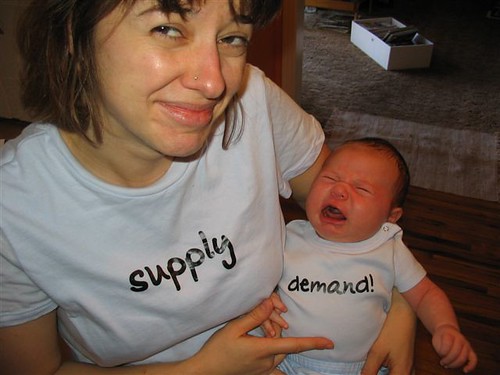
Photo Credit whatnot
If Demand Response is such a good idea and will help get more renewables onto the grid, why isn’t it being embraced by the grid management companies?
Most grid management companies have been in business for decades managing a grid in which the supply is manageable and the demand is variable but reasonably predictable – typically daily demand is “this day last year +2.5%”!
Now grid management companies are faced with a situation where an increasing percentage of their supply is coming from variable sources (i.e. wind) – if the wind blows more than anticipated, too much electricity is generated and if it blows less than anticipated, the converse is true. This totally messes up their planning and consequently grid management companies hate wind, and think of it as unpredictable, negative demand!
Instead of having such a negative attitude to renewables and shutting them down in favour of fossil fuels they should be asking how can we facilitate the greater penetration of clean renewable energy sources onto the grid.
In the coming years, the demand for electricity will increase significantly as transportation goes more electric (electric and plug-in electric cars, bikes, trucks, etc.) and as heating moves more to electricity. This will add demand to the grid system but this increased demand is eminently movable – for the most part you don’t care if your car re-charges at 7pm or 4am as long as it is re-charged when you want to leave for work at 8am. Similarly with heating, if you use storage heaters (and they will become more common) you don’t care when they suck in the heat as long as they heat the house the following day.
If you can move the demand to a time when traditionally the requirement for electricity was low, you can deliver it over the same infrastructure, thereby selling significantly more electricity without having to massively upgrade the network.
The upshot of this is that an increasing movable demand (the ability to time shift consumption) should be a strong business case for a real-time electricity market. Let demand be guided by supply (as indicated by price). With a real time market for electricity you need never shut down wind farms in favour of fossil fuels, you sell more electricity and you enable a greater penetration of renewables onto the grid. Win, win, win.
Why hasn’t this happened already? Ask your local grid management company.

In fact real time demand supply systems for energy have been around for some time for large industrial users. They can purchase power by the kilo-watt minute from a variety of suppliers. The economics are very compelling.
But building real time systems for the consumer market is entirely different matter. Despite all the hub bub about smart meters and so forth, the potential savings of using real time systems is very small. In a recent trial in Canada using smart meters and real time energy pricing, the average monthly saving was less than $8. The reality is that real time energy systems are largely only of benefit to the utility in terms of load averaging.
Consumers dont have much leeway in terms of eliminating loads. They still need hot water. They still want to watch TV etc. Real time systems allow them to possibly shift the peak load and save a little bit of money in using off peak rates – but the savings are miniscule.
Bill
Bill, you are absolutely correct, I should have asked specifically about the consumer market in my post title.
However, I disagree with the thesis that consumers won’t benefit much. The trial in Canada didn’t go far enough. Yes consumers need hot water but water heating is a movable load, as is refrigeration, as is charging plug-in hybrids, as is cloths washing/drying, as is dish washing, etc. Many of these operations can be controlled automatically i.e. have the smart meters be programmable to talk to domestic appliances and have them come on/off or shift thermostats based on electricity pricing.
Also, at nighttime electricity is free in France because the country is 70% nuclear and they have more electricity than they know what to do with. As renewables like wind penetrate the grid further, similar situations will occur. Electricity will become cheap/free/maybe even negative in price to stimulate demand.
When this occurs, domestic savings will be very real.
Make electricity cheaper at any time you want, and buy it back for more when you need it – I will convert my swimming pool to a huge lead-acid battery, and buy an inverter and make money. I am a small time sentimentalist, rogue capitalist and I will take every advantage, legal, shady or otherwise, to make a buck! I exist in great numbers throughout your society and if I serve a useful purpose or not, I will make a buck! This time, it is a win-win. I don’t care. Give me the money!